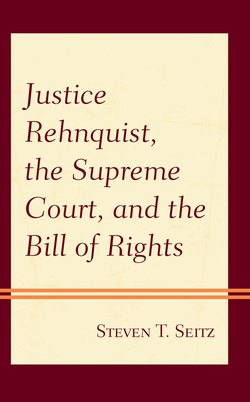Читать книгу Justice Rehnquist, the Supreme Court, and the Bill of Rights - Steven T. Seitz - Страница 15
На сайте Литреса книга снята с продажи.
Size of Constituency
ОглавлениеThe second fix to the faction problem was a work of genius. Many people understood that the small, homogeneous community championed by a Jefferson or Rousseau or Montesquieu was fundamentally inconsistent with the nation-state. A democratic nation-state would either be a contradiction in terms or the uglier forms of majority tyranny. The anti-Federalists insisted that the solution to this dilemma was a continuation of the sovereign states with limited powers given to the central government. The argument that the state governments were closer to the people and thus democratic was itself wishful thinking. Most of the states were too large and too diverse to meet the image of Jefferson or Rousseau or Montesquieu. Whether we can find a passage in Montesquieu supporting political institutions more distant from the people, as Hamilton did in the Federalist Papers, is simply spurious.
Madison turned the blessings of small constituencies into their bane. Small constituencies guaranteed power to factions of emotion or private interest. Large constituencies, on the other hand, allowed local factions and interests to drown out or cancel one another. The result works whether the representative thinks of self as trustee or delegate. A trustee for the people preserves the general interest of the people using self-judgment, albeit with occasional slippage, to identify and pursue the general interest. The delegate listens to the common signal from a divided constituency. Competing factions neutralize one another in the large, heterogeneous constituency. The delegate votes a public opinion refined and clarified into the public interest.
The trustee is cream of the crop within a large constituency, whose size alone multiplies the number of talented people. The delegate may seem overly sensitive to the direction of the wind but listening to the common signal underlying the cacophony at home makes the distinction between a politician and a political leader. Madison salvaged the democratic nation-state. The hamlet no longer owned democracy. The Madisonian formulation set no limits to the expansiveness of new nation-states while still preserving a meaningful role for ordinary people. The two revolutions, American and French respectively, juxtaposed the democratic nation-state and belligerent nationalism. Fascism and Nazism later added other nationalist recipes, but the democratic nation-states provided some global order amidst the ruins of another inhumanity to man.
